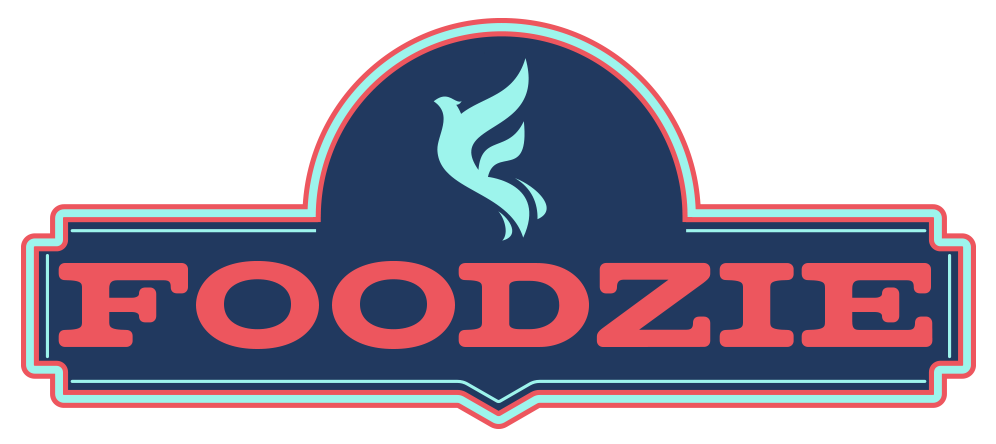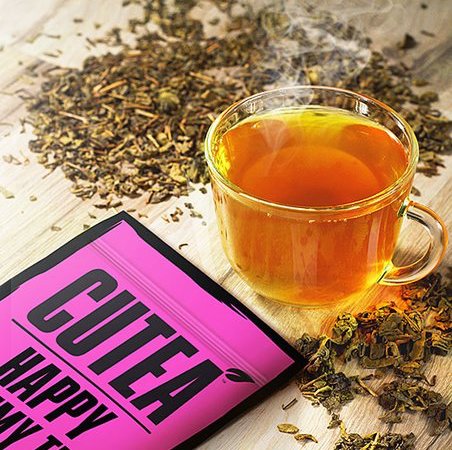What causes bloating? If you’ve ever felt the need to loosen your belt after a meal—or pull a jacket tight to hide a bulging belly—you’ve experienced the discomfort of bloating after eating. It’s uncomfortable at best and extremely embarrassing at worst.
There are a variety of reasons, conditions, and situations that cause stomach bloating, but bloating after eating is usually simple to prevent or solve.
There are a few types of foods and a couple of common behaviors that are responsible for most people’s discomfort. Additionally, there are a few foods and supplements that can combat bloating after a meal.
Once you understand what causes bloating and why it happens, some simple trial-and-error can put an end to bloating after eating.
In this article we’ll focus on how to prevent bloating, or, if it’s too late – how to reduce it.

What Causes Bloating After a Meal?
Bloating is simply the feeling (and usually the appearance) of a swollen belly. Bloating after eating is often caused by a build-up of gas or air in the digestive system, or the excess retention of water.
Bloating can be uncomfortable—or even painful. It can also be embarrassing: That excess gas usually escapes in the form of belching or flatulence. It’s a riot if you’re a seven-year-old boy, but dreadful if you’re at a business lunch or on a date.
The good news is that, while bloating after eating can be indicative of a bigger health issue (see below), it usually isn’t. It’s actually not all that uncommon. Most people can prevent bloating after a meal by learning what and how to eat.
Note: Everyone’s body reacts to food a little differently. This is a complete list of considerations and options, but you don’t have to take all of these steps to avoid bloating after a meal. Try one and a time and see what works for you. It might be helpful to get a small notebook and start keeping a food journal.
How to Prevent Bloating: 12 Keys
1. Watch your fiber intake.
Fiber is a type of plant-based carbohydrate that the body can’t break down. This causes gas build-up in some people.
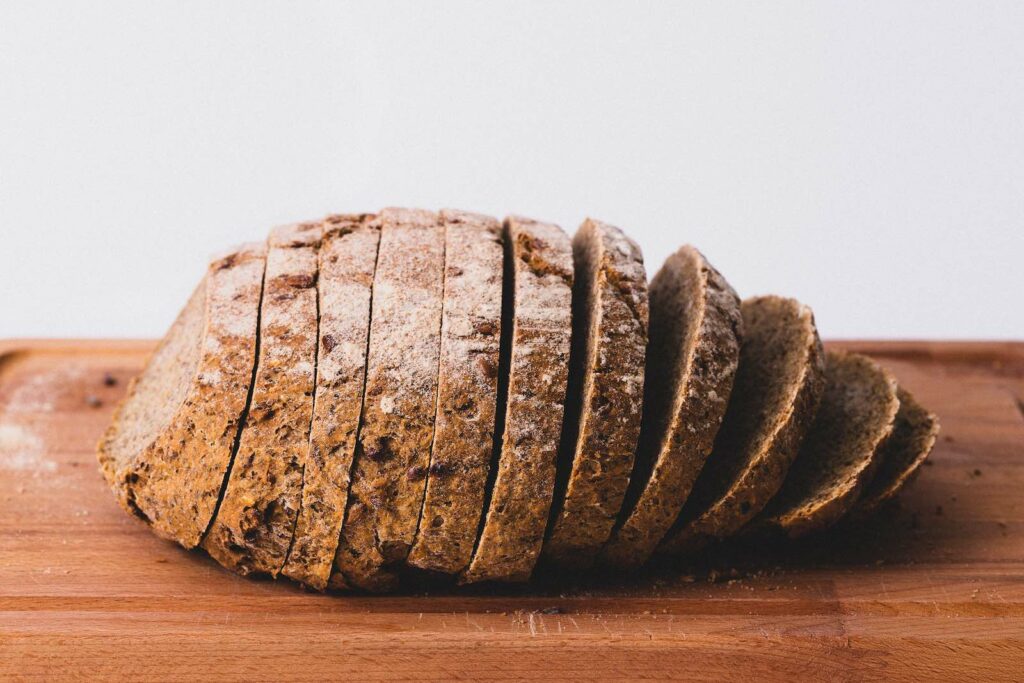
Most people who experience bloating as a result of dietary fiber do so after they’ve deliberately increased their fiber intake. Fiber has a lot of health benefits, such as regulating blood sugar and creating a long-lasting, healthy feeling of being full. So don’t cut out all the fiber.
But if you have recently increased the amount of fiber you’re consuming, and started experiencing bloating after you eat, slow down the fiber increase. Nutritionists often recommend slowly increasing fiber in your diet, if necessary, in order to give your body time to adjust.
Additionally, make sure to drink enough water with your fiber. Hydration helps move the fiber through your system, so it doesn’t create as much gas build-up.
If you do find that you eat more than the recommended amount of fiber (25 grams per day on a 2,000 calorie diet), though, consider cutting back to help reduce bloating. Cut down on fiber by reducing the amount of whole grains and beans/legumes you eat. Other high-fiber foods include apples, broccoli, and Brussels sprouts.
2. Avoid fatty foods.
You know that high-fat foods aren’t good for you anyway, so here’s one more reason to avoid them. Fatty foods move through the digestive system slower than other foods, because they take longer for your body to process.
That backup means that everything stays in your system longer. As digestive enzymes go to work breaking it all down, that decomposition creates gas.
So it’s not really the fatty foods themselves, but what they do to your system. Still, skip fried, refined, and processed foods for a bit, and see if that reduces bloating. If it does, you can still get healthy, unsaturated fats from avocado, nuts, seeds, olives, and salmon.
3. Eat slower.
How often do you sit and enjoy a good meal? Most of us eat at our desks, in our cars, or standing at a counter, in a rush to get back to work or back to the kids. For example, 1 in 5 employees in North America worry that their bosses won’t consider them “hard working” if they take a regular lunch break.

But eating or drinking too quickly can cause bloating for three reasons:
- You’re also swallowing more air. That extra air causes gas build-up in your intestinal tract, which can lead to bloating.
- You’re eating too much. “Feeling full” is the result of chemicals produced by your stomach being interpreted by your brain. It takes about 20 minutes for your brain to fully register a full stomach, and signal you to stop eating. Eating too fast makes it hard for your brain to keep up, and results in you eating too much.
- You’re not chewing enough. Healthy digestion starts with chewing. Swallowing large chunks of food makes your digestive system work harder, increasing the risk of inflammation.
So, to prevent bloating and gas build-up: slow down. Take a real break to eat—your mental health, productivity, and creativity will likely improve as well.
4. Reduce carbonated drinks.
The same gas that gives your sodas and carbonated waters that fizz, is one of the leading causes of bloating. Carbon dioxide can build up in your gut, especially if you drink too quickly.
Still water is always the best beverage option.
5. Get some light exercise after eating.
When you feel bloated after a meal you probably want to go lie down, but that’s actually the worst position to be in. Gas retention is worse when lying down.
So, how to reduce bloating and gas after eating?
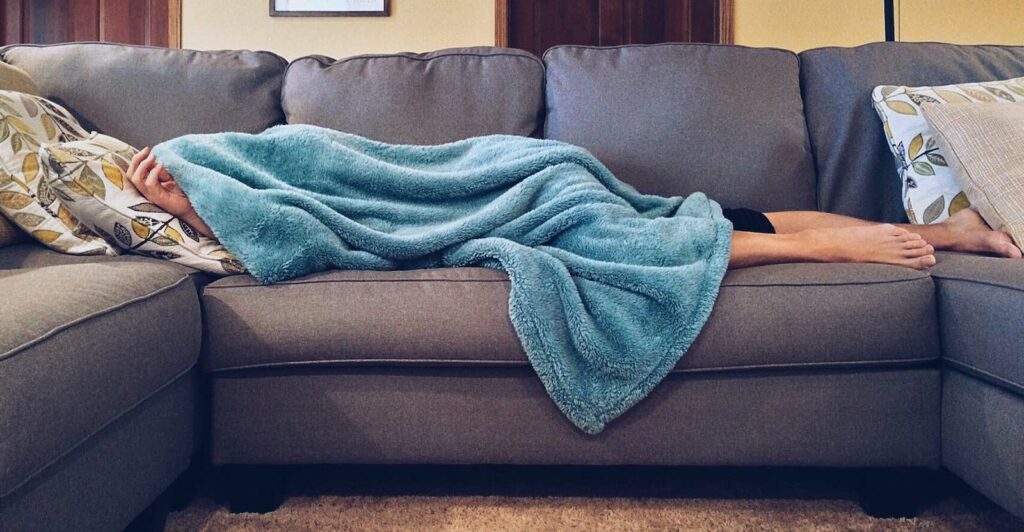
At least one study has proven that 10 to 30 minutes of light exercise—like a simple walk—can help alleviate gas build-up after eating. If you can, make time for a walk after a meal. If not, try a standing desk for a bit after lunch. You may find that it relieves that uncomfortable bloating.
6. Know your own food intolerances and triggers.
In addition to foods that commonly cause bloating—like carbohydrates and fats—some people have allergies and other food intolerances that could be the answer to what causes bloating as well. Wheat, gluten, and dairy are a few common types of food that cause gas to build up in some people’s systems.
- Gluten intolerance can present as bloating, in addition to about a half-dozen other symptoms. Gluten intolerance is different from celiac disease, and affects less than 13% of the population.
- Wheat sensitivities manifest as bloating, cramps, and/or diarrhea. A sensitivity, or intolerance, to wheat products is different from a wheat allergy or gluten intolerance. It affects roughly 1% of the population.
- Lactose intolerance is a sensitivity to dairy products and is very common. It frequently develops in adulthood, which can make it hard to identify at first: People who have never had a problem with dairy suddenly experience bloating after eating and drinking foods they’ve always enjoyed.
So, if you have some of the food sensitivity symptoms, it’s recommended to test for food intolerances. There are two ways to do so: an at-home food sensitivity test and/or a food journal.
There are a few at-home sensitivity tests available, but Everlywell is definitely one of the best. You get a small kit in the mail with everything you need and detailed instructions. Use the materials provided to send in a small blood sample, and in days you get a full report—reviewed by a board certified doctor—on how your body responds to 96 different foods. For many, food intolerances hold the key to what causes bloating.
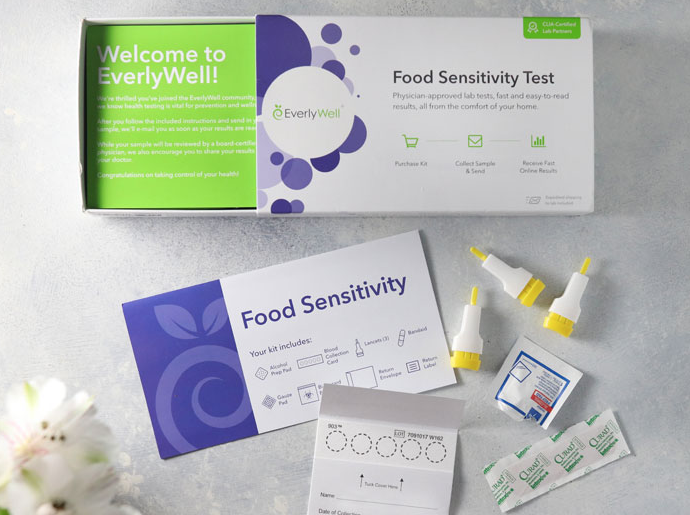
An at-home sensitivity kit can give you a jump start on a food journal, by indicating where to begin, but you can also try a food journal on its own. Try cutting out something that you suspect is causing the problem, and noting the results. Alternately, if it’s something you don’t eat regularly, make a point to eat more of it for a couple of days and see how you feel. If a food intolerance is the culprit behind your bloating, you’ll figure out what it is pretty quickly.
7. Go easy on the salt.
Bloating after a meal isn’t always due to gas build-up. Sometimes it’s water retention, and too much salt can exacerbate the problem. Water retention due to excess salt happens primarily around the abdomen.
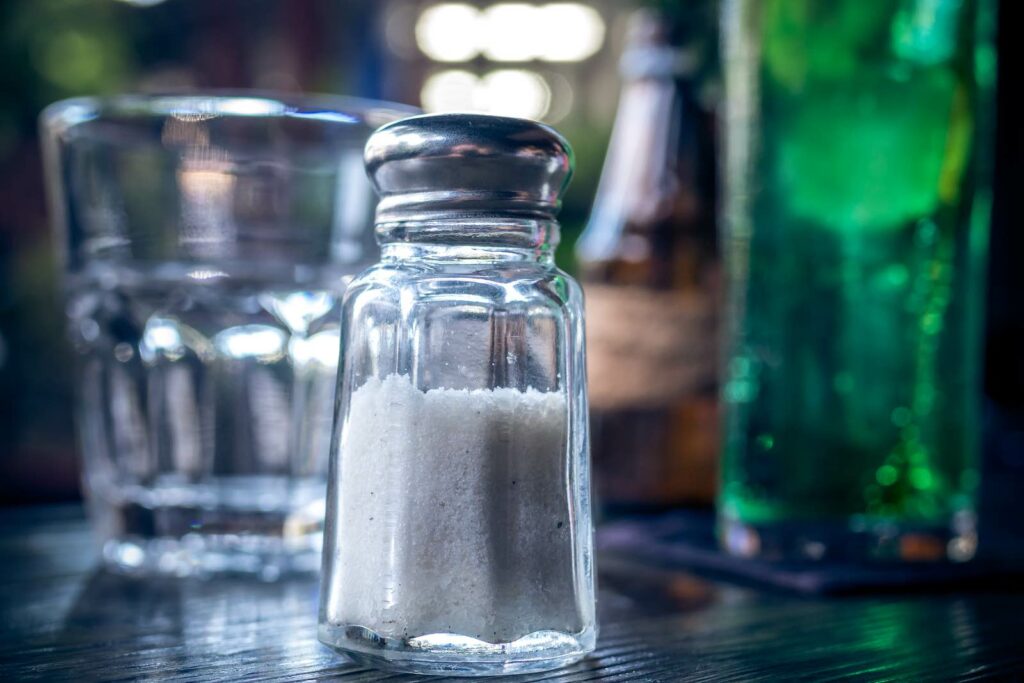
Bloating caused by water retention is harder to solve than bloating due to gas build-up. A gas build-up will usually work its way out of your system, but losing water weight is a whole separate diet and exercise focus.
So avoid the whole mess by declining excessive salt. Choose low-sodium options when available and skip processed snacks. When cooking at home, use more herbs and spices to add natural flavors to food.
8. Have a mint instead of gum.
Chewing gum, similar to eating quickly, causes a person to swallow more air. This, again, becomes trapped in the digestive system and could be the answer to what causes bloating.

Chewing gum may also signal to your body that you’re still eating, which causes the continual production of those digestive enzymes. When your stomach produces more acid than it needs, you feel bloated.
Sugar-free gum comes with yet another risk for bloating: sugar alcohols, or artificial sweeteners. These are common in lots of sugar-free products, and are yet another carbohydrate that doesn’t completely break down—leading to gas and bloating.
If you need a breath freshener after a meal, grab a mint or a breath strip instead of gum.
9. Don’t talk with your mouth full.
Turns out your mother was right: You need to chew with your mouth closed. Another way to make sure you’re not swallowing excess air during a meal is to avoid talking while eating.
10. Add foods that reduce bloat.
How to reduce bloating if not with healthy food? While some foods cause bloating, other foods fight it by flushing or soothing the digestive system.
- Celery, watermelon and zucchini are full of water, so help flush excess salt out of your system. You need to eat them raw, though, to get the full hydration benefit.
- Tomatoes, cantaloupe, and bananas are full of potassium, which helps to remove excess salt from your system and prevent water retention.
- Ginger has been proven to assist with “gastric emptying,” which fights the back-up often caused by fatty foods. Cook with it, take a supplement, or brew it in tea.
- Cucumber is also mostly water, but it has the added benefit of containing quercetin—a plant-based polyphenol with anti-inflammatory properties to help reduce bloating. Chop it up and enjoy it raw or drop a few slices in a glass of water.
- Fennel seeds have long been used by many cultures as an after-dinner digestive supplement. They are anti-inflammatory, but also contain an oil that relaxes intestinal muscles, reducing gas build-up. Try chewing on a small spoonful of fennel seeds, or enjoying a cup of fennel tea, after a meal.
- Peppermint and chamomile teas are also both noted for their abilities to relax the GI system, releasing gas and relieving the culprit of what causes bloating.
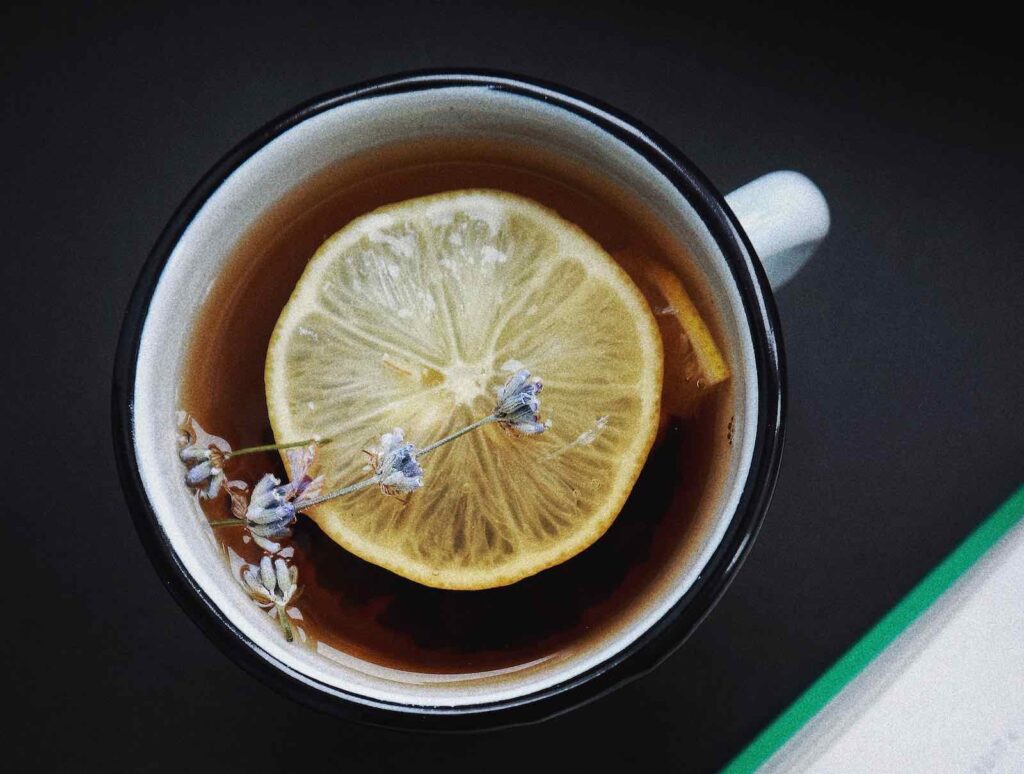
There are even special herbal tea blends designed to combat bloating. If it’s a common problem, it’s worth keeping some on hand. One great example is Cutea Happy Tummy Tea, which combines peppermint and three other herbal teas for a balanced blend that fights bloating and gas.
11. Treat heartburn.
Bloating is also a common symptom of heartburn, which is caused by stomach acid moving back up the esophagus.
If some of the behavioral and dietary changes above still don’t prevent bloating, try an over-the-counter heartburn medication. If you’re unsure, talk with your doctor or a pharmacist—especially if you’re taking other medication.
12. Add a supplement.
There are two other types of dietary supplements that may help:
- Digestive enzymes can help break down foods to prevent clogged digestive tracts and gas build-up. Alpha-galactosidase, for example, helps break down those complex carbohydrates that cause bloating.
- Probiotics help improve overall gut health by regulating good bacteria in your digestive system. A more efficient system will experience less bloating. You can take advantage of a probiotic supplement or enjoy a small serving of yogurt with your meal.
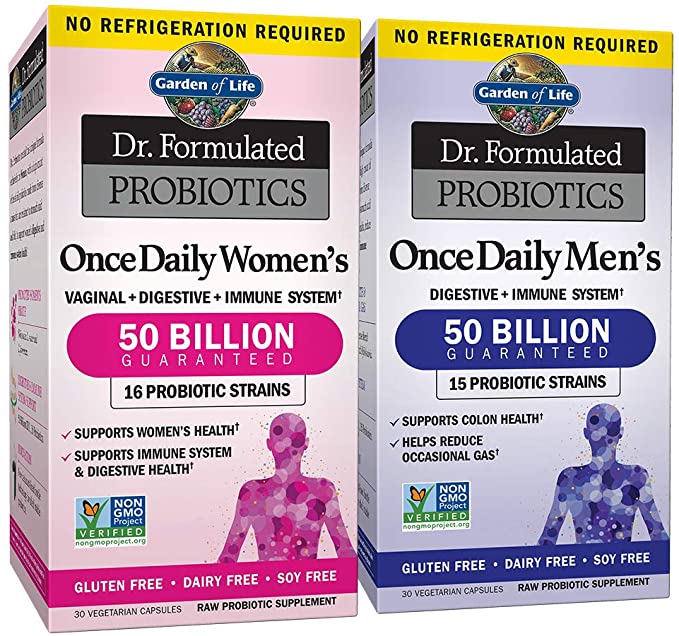
Still Bloating After Eating? Here’s When to See a Doctor
Bloating after a meal is usually a normal reaction to bad food or eating habits, but it is occasionally a sign of a bigger health issue.
The most immediate sign that you need to talk to a doctor about bloating is the presence of additional symptoms. If you experience any of the following in addition to bloating, please set up an appointment with your doctor:
- Severe cramps or abdominal pain
- Nausea
- Constipation, diarrhea, or abnormal bowel movements
- Fatigue
- Skin irritation
- Sudden weight loss
Additionally, if bloating lasts all day, or longer, it’s time to talk to your doctor.
The combination of symptoms could indicate that you’re suffering from Crohn’s disease, celiac disease, or irritable bowel syndrome (IBS).
Put a Stop to Bloating After Meals
It can be a frustrating journey to uncover what causes bloating. Just reading through this list may have turned on some light bulbs already. Many people find that when they reflect for a moment, they can easily discover a pattern in food choices or eating behaviors that are probably leading to feeling bloated after meals.
Now, after reading this article, you’ll know how to prevent bloating, and what’s effective in reducing it.
Once you begin to narrow down the causes of bloating, you can use your instincts and start by testing some of the listed options. Make sure to test one at a time, so you can easily identify which food or behavior is the problem.
And for another great, in-depth article about food sensitivities, click HERE.
ABOUT THE AUTHOR:

